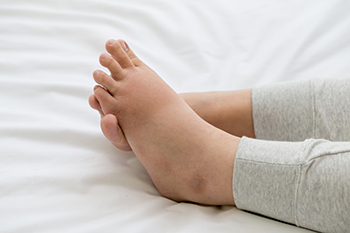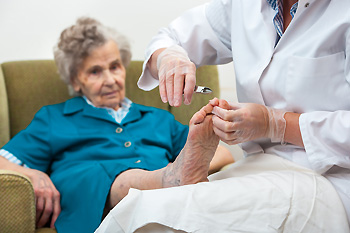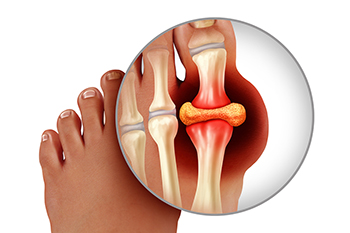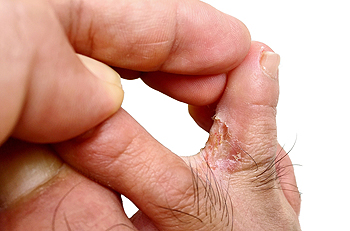Connect With Us
Items filtered by date: October 2022
Swollen Feet Are Common During Pregnancy

A common symptom many women suffer from during pregnancy is swollen feet. This is the result of more fluids that are needed for the growing baby and it can be uncomfortable as the pregnancy progresses. There are simple methods that can be implemented that may help to reduce swollen feet. These include drinking plenty of water daily and wearing comfortable shoes that do not constrict the feet. Reducing salt intake can make a profound difference in controlling swollen feet and research has shown blood circulation may be improved when a gentle exercise routine is practiced regularly. Many women find mild relief when their feet are elevated throughout the day and this can give the body a chance to relax. Swollen feet during pregnancy are an uncomfortable but temporary condition and if you would like more information about how to control this, please consult a podiatrist.
Pregnant women with swollen feet can be treated with a variety of different methods that are readily available. For more information about other cures for swollen feet during pregnancy, consult with one of our podiatrists from The Podiatry Center, PC. Our doctors will attend to all of your foot and ankle needs.
What Foot Problems Can Arise During Pregnancy?
One problem that can occur is overpronation, which occurs when the arch of the foot flattens and tends to roll inward. This can cause pain and discomfort in your heels while you’re walking or even just standing up, trying to support your baby.
Another problem is edema, or swelling in the extremities. This often affects the feet during pregnancy but tends to occur in the later stages.
How Can I Keep My Feet Healthy During Pregnancy?
- Wearing orthotics can provide extra support for the feet and help distribute weight evenly
- Minimize the amount of time spent walking barefoot
- Wear shoes with good arch support
- Wear shoes that allow for good circulation to the feet
- Elevate feet if you experience swelling
- Massage your feet
- Get regular, light exercise, such as walking, to promote blood circulation to the feet
If you have any questions please feel free to contact our office located in Millburn, NJ . We offer the newest diagnostic and treatment technologies for all your foot and ankle needs.
Are You Suffering From Ingrown Toenails?
Foot Bath for Seniors

Seniors must take extra special care in maintaining healthy feet because as individuals age, they can become more susceptible to foot afflictions. One potential way in which a senior might be able to provide extra care for the health of their feet is by performing a foot bath to clean the feet. However, there are several things a senior should keep in mind. First, after performing a foot bath, it is important for the individual to completely dry their feet. A senior might need someone else to help them perform this critical step. Whoever is drying the feet should be mindful of drying in between the toes as well. Second, it is important to make sure that the temperature of the water in the foot bath is sufficient and not too hot. Making sure the temperature is not too hot might be difficult for some seniors because some might have conditions that reduce sensations in the feet. If you want to learn more about elderly foot care, contact a podiatrist today.
Proper foot care is something many older adults forget to consider. If you have any concerns about your feet and ankles, contact one of our podiatrists from The Podiatry Center, PC. Our doctors can provide the care you need to keep you pain-free and on your feet.
The Elderly and Their Feet
As we age we start to notice many changes in our body, but the elder population may not notice them right away. Medical conditions may prevent the elderly to take notice of their foot health right away. Poor vision is a lead contributor to not taking action for the elderly.
Common Conditions
- Neuropathy – can reduce feeling in the feet and can hide many life-threatening medical conditions.
- Reduced flexibility – prevents the ability of proper toenail trimming, and foot cleaning. If left untreated, it may lead to further medical issues.
- Foot sores – amongst the older population can be serious before they are discovered. Some of the problematic conditions they may face are:
- Gouging toenails affecting nearby toe
- Shoes that don’t fit properly
- Pressure sores
- Loss of circulation in legs & feet
- Edema & swelling of feet and ankles
Susceptible Infections
Diabetes and poor circulation can cause general loss of sensitivity over the years, turning a simple cut into a serious issue.
If you have any questions please feel free to contact our office located in Millburn, NJ . We offer the newest diagnostic and treatment technologies for all your foot and ankle needs.
Can Children and Teenagers Suffer With Gout?

Gout is a type of inflammatory arthritis that leads to pain and swelling in and around joints. It is much more common in adults but can affect children and teens as well. Gout affecting this younger age group is referred to as pediatric gout. With gout, excess uric acid in the blood builds up in the joints and forms sharp crystals to form in joints. The joints may become painful, swollen, and stiff. This condition usually starts in the big toe. Given how rare gout is in children, it is often thought to be from an underlying medical problem. This affliction can occur at birth or be associated with obesity, down syndrome, congenital heart disease, or kidney disease among other things. Male children experience a more sudden rise in uric acid levels at around age 12 compared to similarly aged females. This may be due to rising testosterone levels in males, which gives rise to increased uric acid. In contrast, rising estrogen levels in females cause an increase in uric acid removal. Increased uric acid levels may or may not lead to gout. If your child is complaining of big toe joint pain, it is suggested that you see a podiatrist as soon as possible to see if gout is the culprit.
Gout is a foot condition that requires certain treatment and care. If you are seeking treatment, contact one of our podiatrists from The Podiatry Center, PC. Our doctors will treat your foot and ankle needs.
What Is Gout?
Gout is a type of arthritis caused by a buildup of uric acid in the bloodstream. It often develops in the foot, especially the big toe area, although it can manifest in other parts of the body as well. Gout can make walking and standing very painful and is especially common in diabetics and the obese.
People typically get gout because of a poor diet. Genetic predisposition is also a factor. The children of parents who have had gout frequently have a chance of developing it themselves.
Gout can easily be identified by redness and inflammation of the big toe and the surrounding areas of the foot. Other symptoms include extreme fatigue, joint pain, and running high fevers. Sometimes corticosteroid drugs can be prescribed to treat gout, but the best way to combat this disease is to get more exercise and eat a better diet.
If you have any questions please feel free to contact our office located in Millburn, NJ . We offer the newest diagnostic and treatment technologies for all your foot and ankle needs.
Reminder: When Was the Last Time...?
Athlete’s Foot May Be a Chronic Skin Infection

Tinea pedis, more commonly known as athlete’s foot, is considered to be a fungal skin infection. It is generally found between the toes or on the soles of the feet. The fungus enters the body through small cracks in the skin and may develop into a chronic infection. This type of fungus lives in warm and moist environments and is contagious. Some of the places where appropriate shoes are urged to be worn are public swimming pools, shower room floors, and locker rooms. There are methods that can be implemented to help prevent the spread of athlete's foot. These include keeping the toenails trimmed and airing shoes out while alternating them every other day. It is beneficial to wear shoes and socks that are made of breathable materials, which helps to keep the feet clean and dry. Athlete’s foot generally does not heal on its own, and a podiatrist is often consulted who can provide an accurate diagnosis and offer correct treatment options.
Athlete’s foot is an inconvenient condition that can be easily reduced with the proper treatment. If you have any concerns about your feet and ankles, contact one of our podiatrists from The Podiatry Center, PC. Our doctors will treat your foot and ankle needs.
Athlete’s Foot: The Sole Story
Athlete's foot, also known as tinea pedis, can be an extremely contagious foot infection. It is commonly contracted in public changing areas and bathrooms, dormitory style living quarters, around locker rooms and public swimming pools, or anywhere your feet often come into contact with other people.
Solutions to Combat Athlete’s Foot
- Hydrate your feet by using lotion
- Exfoliate
- Buff off nails
- Use of anti-fungal products
- Examine your feet and visit your doctor if any suspicious blisters or cuts develop
Athlete’s foot can cause many irritating symptoms such as dry and flaking skin, itching, and redness. Some more severe symptoms can include bleeding and cracked skin, intense itching and burning, and even pain when walking. In the worst cases, Athlete’s foot can cause blistering as well. Speak to your podiatrist for a better understanding of the different causes of Athlete’s foot, as well as help in determining which treatment options are best for you.
If you have any questions please feel free to contact our office located in Millburn, NJ . We offer the newest diagnostic and treatment technologies for all your foot and ankle needs.
Blog Archives
- June 2025
- May 2025
- April 2025
- March 2025
- February 2025
- January 2025
- December 2024
- November 2024
- October 2024
- September 2024
- August 2024
- July 2024
- June 2024
- May 2024
- April 2024
- March 2024
- February 2024
- January 2024
- December 2023
- November 2023
- October 2023
- September 2023
- August 2023
- July 2023
- June 2023
- May 2023
- April 2023
- March 2023
- February 2023
- January 2023
- December 2022
- November 2022
- October 2022
- September 2022
- August 2022
- July 2022
- June 2022
- May 2022
- April 2022
- March 2022
- February 2022
- January 2022
- December 2021
- November 2021
- October 2021
- September 2021
- August 2021
- July 2021
- June 2021
- May 2021
- April 2021
- March 2021
- February 2021
- January 2021
- December 2020
- November 2020
- October 2020
- September 2020
- August 2020
- July 2020
- June 2020
- May 2020
- April 2020
- March 2020
- February 2020
- January 2020
- December 2019
- November 2019
- October 2019
- September 2019
- August 2019
- July 2019
- June 2019
- May 2019
- April 2019
- March 2019
- February 2019
- January 2019
- December 2018
- November 2018
- October 2018
- September 2018
- August 2018
- July 2018
- June 2018
- May 2018
- April 2018
- March 2018
- February 2018
- January 2018
- December 2017
- November 2017
- October 2017
- September 2017
- August 2017
- July 2017
- June 2017
- May 2017
- April 2017
- March 2017
- February 2017
- January 2017
- December 2016
- November 2016
- October 2016
- September 2016
- August 2016
- July 2016
- June 2016
- May 2016
- April 2016
- March 2016
- February 2016
- January 2016
- December 2015
- November 2015
- October 2015
- September 2015
- August 2015
- July 2015
- June 2015
- May 2015
- January 2014
- December 2013
- November 2013
- October 2013
- September 2013
- August 2013
- July 2013
- June 2013
- May 2013
- April 2013
- March 2013
- February 2013
- January 2013
- December 2012
- November 2012
- October 2012
- September 2012
- August 2012
- July 2012
- June 2012


